NTHU-NCCU JointCertPT Workshop
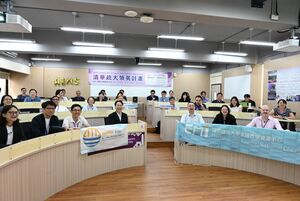
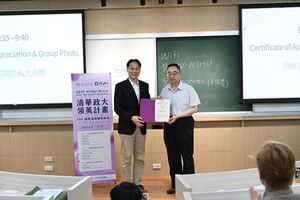
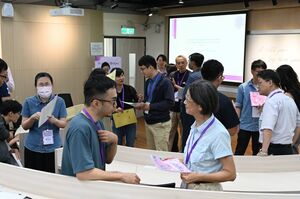
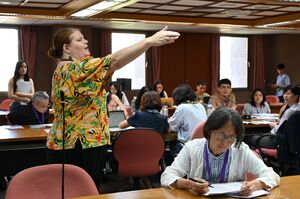
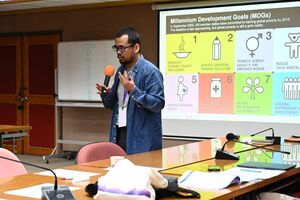
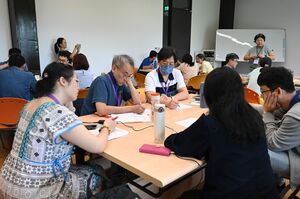
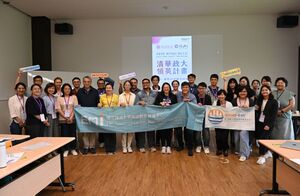
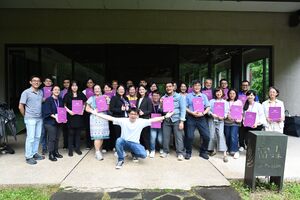
【Article by EMI Resource CenterI】
To promote English as a Medium of Instruction (EMI) and enhance faculty members’ professional capacity in English-taught courses, the EMI Resource Center at National Chengchi University (NCCU) and the Center for English Teaching Excellence at National Tsing Hua University (NTHU) co-organized the “NTHU-NCCU JointCertPT Workshop”, which officially took place from June 9 to 13, 2025. This five-day in-person training program constitutes the 35-hour instructional phase of the Trinity College London CertPT international certification course. Topics included effective lecturing strategies, language awareness, CLIL-based (Content and Language Integrated Learning) instruction, and microteaching practices. A total of 35 faculty members participated: 14 from NCCU and 21 from NTHU.
At the opening ceremony, Professor Yung-Hsien Wu, Vice President for Academic Affairs at NTHU and Professor in the Department of Engineering and System Science, expressed his delight at the complementary collaboration between NTHU’s strength in science and technology and NCCU’s humanities background, opening new possibilities for faculty development and curriculum innovation. Professor Chi-Ping Lin, Vice President for Academic Affairs at NCCU and Professor in the Department of Chinese Literature, thanked both universities for this valuable opportunity and expressed hope that the in-person exchange would deepen mutual understanding and foster long-term collaboration. Professor Siaw-Fong Chung, Associate Executive Director of the Bilingual Education and Multicultural Promotion Office and Director of the EMI Resource Center at NCCU; Distinguished Professor Yi-Wen Liu, Associate Vice President for Academic Affairs at NTHU and Professor in the Department of Electrical Engineering; and Distinguished Professor Yu-Chun Lin, Team Leader of the EMI Center at NTHU and faculty member in the Institute of Molecular Medicine, College of Life Sciences and Medicine, also gave speeches at the opening, highlighting the significance and scale of this program.
The first day of training featured Steven Murray, CEO of the English Teaching Institute (ETI) and a seasoned teacher trainer, who delivered a lecture titled “Effective Lecturing.” He emphasized that successful EMI teaching requires a clear course structure, appropriate use of language, and flexible interactive strategies. The second session explored how task design grounded in the CLIL approach can enhance student engagement and language production. A key technique introduced was the “praise sandwich” feedback model, underscoring the importance of constructive and positive peer feedback in microteaching to create a safe, supportive learning environment. On the second day, Professor Yi-Shin Chen from the Department of Computer Science at NTHU led the morning session with a talk titled “Using Cummins’ Framework to Effectively Develop Cognitive Skills.” She explained how teachers can design cognitively demanding yet contextually supported tasks, such as guiding students to visualize and describe mental images in English, using key phrases to organize thoughts, and incorporating visuals, hands-on activities, or group collaboration to reduce language anxiety and increase participation. In the afternoon, Jennifer W. Liu, Lecturer at the Center of English Education, NTHU, presented on “Fostering Student Speaking in EMI and CLIL Courses: Pedagogical Strategies and Classroom Applications.” She shared practical approaches for encouraging student speaking as a means to improve comprehension and learning, including language scaffolding, pre-task activities, and cooperative tasks to lower anxiety and enhance expression.
On the third day, Jenna Cody, teacher trainer at ETI, led a session titled “Developing Language Awareness: Focus on Functional Language.” The session aimed to help teachers guide students in using appropriate language expressions in academic contexts. The fourth day featured Dr. Farhad A.K. Cassim, Course Director of the TCL CertPT at the General Education Center, National Yunlin University of Science and Technology (YunTech), who presented “Promoting Active Listening in EMI Classes.” His session focused on the design of EMI activities that integrate guided interaction and cognitive/metacognitive strategies to foster students’ listening comprehension. On the fifth day, Jane Lu, CertPT Course Trainer at the General Education Center, YunTech, delivered a lecture titled “Designing Interactive Activities and Fostering Learner Autonomy.” She pointed out that EMI classes benefit from task-based activities such as presentations, sequencing, and matching, which boost student engagement and motivation. Teachers were encouraged to set clear learning objectives, create a supportive environment, and use reflection and peer feedback to help students build autonomy and self-awareness, ultimately increasing their sense of responsibility and sustained effort.
Throughout the course, multiple small-group discussion activities were organized. Teachers enthusiastically exchanged ideas and shared teaching experiences, jotting down concepts and ideas on whiteboards to visually represent abstract theories. These interactions acted as scaffolding for learning, deepening participants' understanding of core EMI principles and inspiring a wealth of pedagogical creativity. The atmosphere was dynamic and collaborative, with teachers actively engaging in every session, showing strong enthusiasm and professional reflection. In addition to attending the sessions, all participants were required to complete four extension assignments: (1) evaluating teaching materials, (2) adapting existing materials, (3) designing new materials, and (4) reflecting on the implementation. These tasks encouraged teachers to integrate theory with classroom practice and examine the balance between language difficulty, learning objectives, and student engagement. Through this iterative internalization process, participants not only gained theoretical knowledge but also refined their instructional pacing and pedagogical mindset, ensuring practical application of the training outcomes in future EMI courses.
Microteaching was also a core activity of the training, with 30 participants taking part. This activity was divided into three stages. First, each participant selected a topic from the UN Sustainable Development Goals (SDGs) and designed a 10-minute simulated EMI lesson integrating their professional expertise. This was followed by individualized feedback from trainers and small-group discussions. Peers observed and commented on presentations using four criteria: presentation skills, interaction design, language use, and pronunciation. The final stage involved peer feedback in plenary, where each group shared key observations and suggestions, fostering professional dialogue and collective reflection. Participants found microteaching highly beneficial, as it allowed them to reflect on their own teaching by observing others and drawing inspiration for improvement. To conclude the microteaching, Yun-Yin Huang, Director of the Student Group at the EMI Center, NTHU, provided a summary and evaluation. She praised the teachers for their engaging instruction and interactive classroom practices, highlighting techniques such as moving off the podium to interact with students, using gestures and eye contact to enhance engagement. She also suggested simplifying slide content to avoid cognitive overload and using tools like laser pointers to guide attention more effectively.
Over the five days, the program journeyed from NTHU to NCCU and finally to Mabuville. Around shared meals and discussions, teachers transcended disciplinary, institutional, and generational boundaries to share teaching challenges, spark inspiration, and explore future collaborations. The program concluded with a graduation ceremony and group photo, followed by a celebratory banquet. Participants walked away not only with strengthened knowledge and skills in EMI pedagogy but also with new friendships and partnerships, laying a strong foundation for advancing bilingual education in the future.


 Fax:886-2-29379611
Fax:886-2-29379611